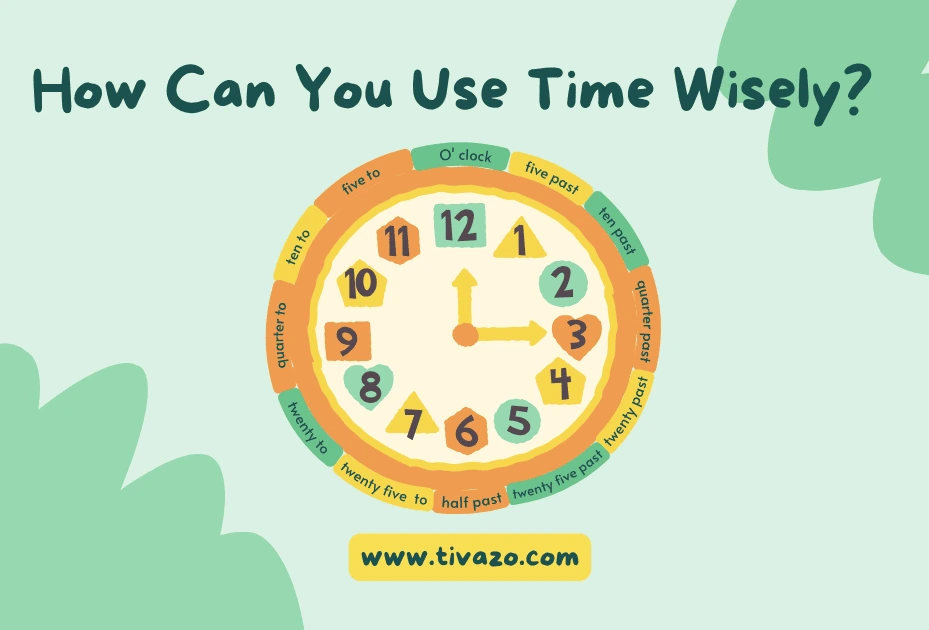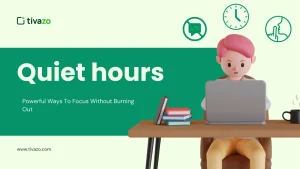Have you ever wished that there were just more than 24 hours in a day? If yes, you are not the only one. Time flies quickly, but what if you could command time?
The key to increased productivity does not lie in working more but in being able to waste no more time. Whether you have too much to do or simply desire to have more spare time, better management of your hours can change your day.
To achieve more with less stress, you need to learn to use time wisely. By spending your time efficiently, you will become clearer, have less burnout, and increase your productivity without having to work harder. Whether it is creating precise goals or avoiding distractions, any alteration in your time management can make a significant difference. This blog will provide you with useful tips on how to manage your time and effective steps that you can take to ensure that you are focused, efficient, and in charge of your time.
Let’s dive in.
Key Highlights:
- Different Ways to Use Time Wisely
- How To Use Time Wisely For Students
- How To Spend Your Time Wisely At Home
- What Successful People Say About Time Management
Different Ways To Use Time Wisely

1. Set Clear, Achievable Goals
If you don’t know what you’re working toward, you risk wasting time on unimportant things. One of the smartest ways to use time wisely is to set clear, achievable goals. Prepare a to-do list for the next day and break your big goals into small, manageable tasks. This will guide your actions and ensure you’re focused on what truly matters. A study by the Dominican University of California found that people who write down their goals are 42% more likely to achieve them. Use the SMART method (Specific, Measurable, Achievable, Relevant, and Time-bound) to make your goals more effective and to use time wisely every single day.
2. Prioritize Tasks Using the Eisenhower Matrix
To use time wisely, you need to know the difference between what is urgent and what is important. The Eisenhower Matrix helps you prioritize tasks by categorizing them into four groups: urgent and important, important but not urgent, urgent but not important, and neither. This system allows you to focus on tasks that truly matter and prevents you from reacting to every little disruption. When you spend time on what really moves the needle, you don’t just stay busy—you use time wisely and work smart.
3. Avoid Multitasking
Multitasking may feel efficient, but it’s one of the worst ways to spend your time. To truly use time wisely, focus on one task at a time. Research from the American Psychological Association shows multitasking can reduce productivity by up to 40%. Instead, embrace “deep work”—uninterrupted, focused work on a single task. The Pomodoro Technique is perfect for this: work for 25 minutes, rest for 5, and after four rounds, take a longer break. This method will help you stay focused and use time wisely in your daily routine.
4. Eliminate Time Wasters
You can’t use time wisely if you’re unaware of where your time is going. Distractions like social media, endless notifications, and unnecessary meetings quietly eat up your day. Track your time for a week using tools like Tivazo. Identify your top time-wasting activities and replace them with better habits. For example, swap phone-scrolling with a quick walk to refresh your brain. Awareness is the first step to change, and it’s how you begin to use time wisely.
5. Delegate and Automate Repetitive Tasks
Trying to do everything yourself is a fast way to burn out. Smart professionals use time wisely by automating repetitive tasks and delegating work that doesn’t require their direct input. Use tools like Calendly to schedule meetings, filters for your inbox, and platforms like Fiverr or Upwork to outsource administrative work. McKinsey reports that 45% of work tasks can be automated with existing technology. Save your time for what truly needs your expertise and use time wisely to boost your productivity.
6. Build a Daily Routine
One of the simplest ways to use time wisely is by following a consistent daily routine. Routines help reduce decision fatigue and bring structure to your day. Align your tasks with your natural energy peaks—tackle challenging work in the morning if you’re an early riser or save creative tasks for the evening if you’re a night owl. Include focused work sessions, breaks, and even moments for distractions. A well-planned day enables you to stay in control and use time wisely, even during life’s unpredictable moments.
7. Reflect, Adjust, and Improve Weekly
If you want to use time wisely, take time to reflect weekly. Spend just 15-30 minutes reviewing what went well, what didn’t, and how you can improve. This habit creates a powerful feedback loop that increases long-term productivity. Track these reflections in a journal or a digital tool like Notion. When you make weekly adjustments, you’ll notice patterns and eliminate inefficiencies, helping you consistently use time wisely and stay on track with your goals.
You May Also Like: Productivity: 3 Powerful Time Management Links to Efficiency
Bonus: Use Technology—but Set Boundaries
Digital tools like Notion, Google Calendar, and Tivazo can help you manage time better, but they can also become distractions. To use time wisely in a digital world, create boundaries. Turn off non-essential notifications, use “Do Not Disturb” mode, and only check emails during set times. Let technology support your productivity instead of stealing your attention. That’s how modern professionals use time wisely in today’s tech-driven world.
How To Use Time Wisely For Students

Using time wisely as a student means balancing studies, extracurriculars, and personal life without burning out. The first step would be to develop concrete academic objectives and divide them into daily/weekly assignments. Make a study timetable regarding your most attentive time and adhere to it strictly. To prevent the problem of procrastination, sort out important tasks by applying such methods as the Eisenhower Matrix or the Pomodoro Technique.
Get rid of all the distractions, such as too much phone usage or social media, when studying. Rather than that, keep track of things using Notion or Google Calendar. Look back each week and see what is working and fit your schedule to keep up the pace. Effective use of your time will not only allow you to succeed in your academic life but will also help you relieve stress to have time for your hobbies, and have a rest.
Note: It is not that successful students work more; they just spend their time more wisely. Be efficient with your time, and you will always be ahead in reaching your goals.
How To Spend Your Time Wisely At Home

The first thing you can do to utilize your time well at home is to make a basic daily schedule that consists of work, rest, and personal development. Manage your time by having a specific purpose – it can be cleaning the house, acquiring a new skill, or having quality time with the family. Limitless scrolling will only bring you closer to wasting time, so it is better to define boundaries and substitute this toxic habit with something useful, such as reading, cooking, or working out.
Sticking to one tool or another, such as a timer or to-do list, will help to keep the schedule and utilize every hour to its fullest potential. Simple things, such as cleaning up your area or meal planning, can save you time in the future. Look back at the end of the day to find out how you spent your time and in what areas you need to make adjustments.
What Successful People Say About Time Management
Ever wish to know what made wildly successful people different (and better) than the rest? It is not superpowers but the way they spend time wisely.
As one of the most disciplined billionaires in the world,
💡Warren Buffett famously said,
“The secret of successful people and very successful people is that very successful people will say no to practically everything.”
That is not merely a tip; that is an attitude. No is a complete sentence that guards your time to do what is important.
The great writer of the legendary book The 7 Habits of Highly Effective People, Stephen Covey, considered that we have to put first things first. That is, do not allow the urgent to prevent you from performing the important. This principle assists you in spending your time efficiently rather than responding to pandemonium.
These insights can provide the fact that mastering time does not mean doing more, but doing what matters most. If they (greats) live by it, then should we not?
Structured Reflection Framework: Your Weekly Time Check-In
Using time wisely isn’t just about planning; it’s also about pausing and learning from how you spend your week. That’s where the Structured Reflection Framework comes in.
Instead of simply reviewing your tasks at the end of the week, use this simple 3-step method to stay on track and grow better with time.
✅ Step 1: List Your Top 3 Wins
Think about the best parts of your week. What went well? What made you proud?
Write down three wins. These can be big or small:
- Finished a project before the deadline
- Woke up early 4 days in a row
- Took a full lunch break without distractions
Why this matters: Wins show your progress. They keep you motivated and remind you that smart time use pays off.
⏳ Step 2: Identify 2 Time-Wasters
Next, ask: “Where did my time slip away?”
Write down two things that wasted your time. For example:
- Scrolled social media too much
- Said yes to a meeting that wasn’t needed
Why this matters: You can’t fix what you don’t see. Spotting time-wasters helps you cut them out next week.
🔁 Step 3: Adjust One Habit for Next Week
Choose just one thing to improve. Small steps work best. Try:
- Turn off phone notifications after 9 PM
- Use a timer while doing focused work
- Say “no” to low-priority tasks
Why this matters: This one adjustment builds long-term change without stress.
Make It a Weekly Ritual
Set a 15-minute block every Sunday to reflect using this framework. Use a simple notebook, a journaling app like Notion, or even voice notes. Over time, you’ll notice patterns, fix leaks in your schedule, and grow into a master of your time.
⏱️ Remember: Reflection is not about guilt — it’s about growth.
Conclusion
Your greatest asset is time, and once time is gone, you cannot buy it back. However, when you understand how to make wise use of time, you are in charge of your time, you are less stressed, and you can achieve your maximum productivity.
In summary, the seven clever tips, which include having clear goals, using priorities, not multitasking, eliminating time wasters, delegating, creating routines, and weekly reflections, provide a method of practical guidance toward an efficient and satisfying life. What good is using your time wisely does not mean doing more, it means doing what is most important.
Then you are ready to use your time well and accomplish more. Begin to implement these suggestions, and watch how more productive and well-rounded your days will be.
What are the 3 steps to using time wisely?
Set clear priorities, create a structured schedule, and eliminate time-wasting activities.
What do you call someone who uses their time wisely?
A person who uses their time wisely is often called productive, efficient, or a good time manager.
How do you spend time wisely at home?
Plan your day, focus on meaningful tasks, reduce distractions, and balance work with rest and personal growth.




